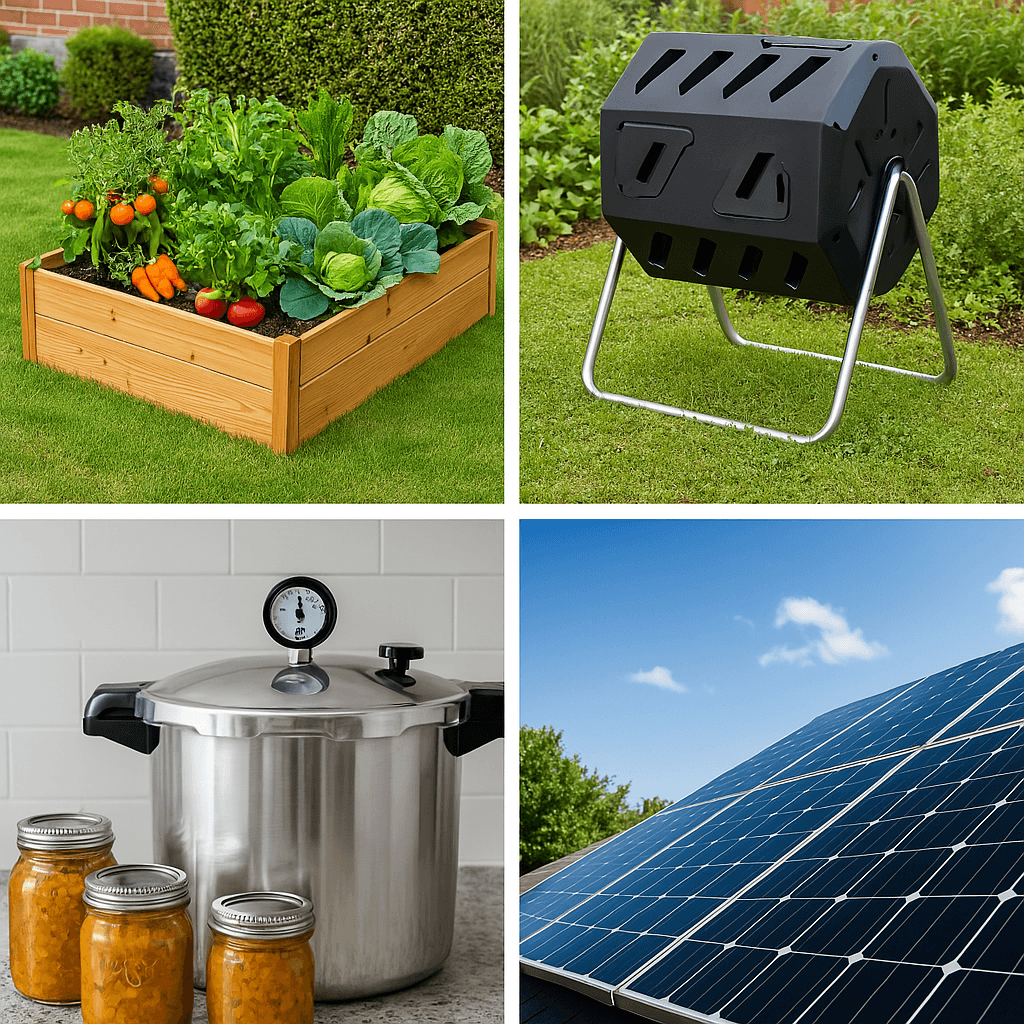
Self-sufficient living is the way to go if you dream of living more sustainably, cutting costs, or becoming less dependent on outside systems. Whether you’re fully off-grid or just starting your journey, having the right tools makes all the difference.
In this guide, we’re sharing 20 self-sufficient living products worth buying — from food production and preservation to water, energy, and daily off-grid essentials. These items aren’t just for hardcore homesteaders. They’re perfect for backyard gardeners, tiny home dwellers, preppers, and anyone who wants more freedom and resilience in their everyday life.
Let’s dive in!
Food Production Essentials
1. Raised Garden Beds
Raised beds make gardening easier to manage and more productive. They improve soil drainage, reduce weeds, and give you total control over soil quality.
2. Compost Bin or Tumbler
Composting is one of the easiest and most rewarding ways to reduce waste and create nutrient-rich soil for your garden.
Indoor Options:
- Use a compact kitchen compost bin with a charcoal filter to store food scraps without odors. These are great for apartments or homes with limited outdoor space.
- Try worm-composting bins (vermicomposting) under your sink or in a basement. Red wigglers break down scraps into super-rich worm castings.
Outdoor Options:
- A rotating compost tumbler speeds up the composting process and keeps things tidy. It is great for urban and suburban backyards.
- To handle large garden waste loads, make a DIY compost pile or stationary bin from pallets, wire mesh, or plastic.
Electric Option:
- Consider a countertop electric composter for fast, odorless composting indoors. These machines can turn food scraps into usable compost in just a few hours, making them perfect for small spaces or busy lifestyles.
Whichever method you choose, composting turns everyday waste into powerful, organic fertilizer for your self-sufficient lifestyle.
3. Heirloom Seed Vault
Keep a stash of non-GMO, heirloom seeds that can be replanted year after year. This is great for long-term food security and biodiversity.
4. Indoor Grow Lights
Perfect for growing food year-round, especially during winter months. Use them for seedlings or full indoor gardens.
5. Backyard Chicken Coop Kit
Raising chickens gives you fresh eggs, compostable manure, and pest control. A pre-built or DIY coop keeps them safe and productive.
Food Preservation & Storage
6. Dehydrator
Dry fruits, vegetables, herbs, and even meat to extend shelf life and preserve harvests without chemicals.
Related article: The Ultimate Guide to Dehydrating Food
7. Pressure Canner
Pressure canning is essential for canning low-acid foods like beans, soups, and meat. It helps you stock up your pantry with shelf-stable meals that last months or even years.
Stovetop Pressure Canners:
- These traditional models are incredibly durable and work without electricity, making them ideal for off-grid setups or emergencies.
- Great for large batch canning and long-term food preservation.
Electric Pressure Canners:
- These plug-in models are user-friendly and have digital settings for time and pressure.
- Perfect for beginners or anyone looking for a more convenient and automated canning experience.
- Some electric multi-cookers also feature a canning option, although it is crucial to verify that they meet USDA safety guidelines for pressure canning.
Whether you prefer manual control or a modern twist, a pressure canner is necessary for any self-sufficient kitchen.
related Article: Canning 101: Methods and Best Starter Kits for Beginners
8. Vacuum Sealer
Seal dry goods, meat, and produce for freezing or storing. Great for portioning and reducing food waste.
9. Mylar Bags + Oxygen Absorbers
Ideal for long-term storage of bulk grains, beans, and dehydrated foods. Keeps them fresh and pest-free for years.
10. Root Cellar Storage Bins
Bins help organize and preserve root vegetables naturally without electricity if you have a basement or cool storage area.
Water Independence
11. Rainwater Collection System
Harvesting rain is an eco-friendly way to irrigate your garden and even supply your home water system (with proper filtration).
12. Berkey or Gravity Water Filter
Clean, drinkable water without electricity. These filters remove bacteria, viruses, and chemicals from any freshwater source.
13. Manual Well Pump or Bucket System
A manual pump gives you water access even during power outages if you have a well.
Off-Grid Energy & Heating
14. Solar Panel Starter Kit
Power essential electronics and small appliances with free solar energy. This is ideal for cabins, RVs, or grid-down scenarios.
15. Rocket Stove or Wood Stove
Cook meals or heat your space without propane or electricity. These are efficient and easy to use with small wood scraps.
16. Solar Lanterns or Hand-Crank Lights
Forget batteries. Light up your home or campsite with sustainable solar or kinetic-powered lanterns.
DIY & Home Essentials
17. Manual Kitchen Tools
Hand-crank grinders, egg beaters, butter churns, and can openers are useful when the power is out or to reduce energy use.
18. Cast Iron Cookware
It is durable, long-lasting, and perfect for campfires, wood stoves, or propane cooktops. Plus, it naturally adds iron to your meals.
19. Basic Tool Kit
Hammer, screwdrivers, pliers, hand saws, and wrenches. If you’re living off-grid or fixing things on the fly, this is non-negotiable.
20. Clothesline & Drying Rack
Cut your energy use and keep laundry simple. Line drying is effective, sustainable, and perfect for homesteaders.
Conclusion
You don’t have to go 100% off-grid to enjoy the benefits of self-sufficient living. With just a few of these tools, you can grow your own food, preserve it, stay warm and lit, and reduce dependence on modern systems.
Start small. Add one or two items that fit your lifestyle. Over time, these products can help you save money, live more sustainably, and feel prepared for whatever life throws your way.
